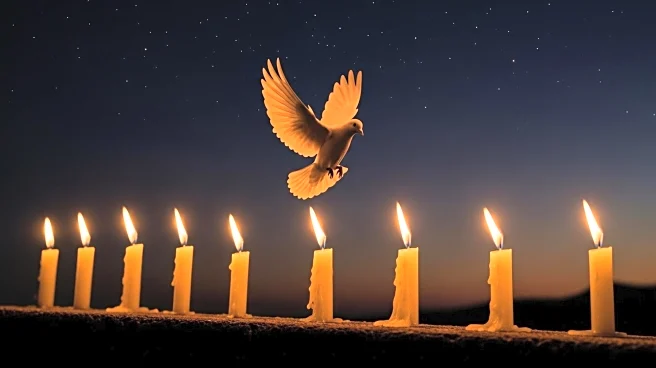What is the story about?
What's Happening?
On the 690th day since the October 7 attack, Israeli families of hostages and their supporters organized a national strike called 'Israel Stands Together' to demand the return of 50 hostages still held in Gaza. The protest transformed intersections into sites of defiance and mourning, with Hostages Square in Tel Aviv becoming a focal point for demonstrations. Families unfurled giant flags outside the US Embassy and set up a hunger installation to symbolize their plight. The protest was marked by speeches from family members, including Hagit Chen and Einav Zangauker, who criticized the Israeli government's lack of progress in negotiations. Holocaust survivor Colette Avital emphasized the historical significance of the protest, urging public action to end the hostages' ordeal.
Why It's Important?
The protest highlights the ongoing struggle of Israeli families to secure the release of hostages held by Hamas, underscoring the emotional and political tensions within Israel. The event reflects widespread dissatisfaction with the government's handling of the hostage situation, which has persisted for nearly two years. The families' call for action represents a broader demand for accountability and decisive leadership in resolving the conflict. The involvement of international figures, such as President Trump, in past negotiations adds a layer of complexity to the situation, indicating potential shifts in diplomatic efforts. The protest also raises questions about human rights and the ethical responsibilities of governments in protecting their citizens.
What's Next?
The families and supporters plan to continue their demonstrations, urging the Israeli government to engage in negotiations and reach an agreement for the hostages' release. The Hostages and Missing Families Forum has called for sustained public pressure to compel government action. The protest organizers aim to maintain momentum by encouraging more citizens to join their cause, potentially leading to larger demonstrations. The Israeli government faces increasing pressure to respond to the mediators' proposal and address the families' demands. The situation may also prompt further international involvement, as families appeal to foreign governments for support.
Beyond the Headlines
The protest raises deeper ethical questions about the treatment of hostages and the responsibilities of governments in conflict situations. It highlights the cultural and historical dimensions of collective action in Israel, drawing parallels to past struggles for human rights. The event underscores the importance of public solidarity and grassroots movements in influencing political decisions. The families' criticism of the Red Cross and other international organizations points to broader issues of accountability and effectiveness in humanitarian efforts. The protest may also impact Israeli society's perception of its government's leadership and its role in international diplomacy.
















